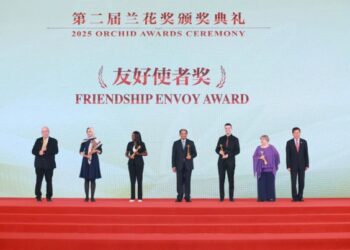China feeds on its futuristic and high-tech universe to conquer the global imagination.
Visitors at the Science Fiction Conference of China 2025, in Beijing, March 27, 2025
When we think of the Chinese cinema or series, some genres spontaneously come to mind, such as historical dramas, war romances, Hong Kong gangster films or everyday family series. But if there is a genre that we rarely mention, it is science fiction (SF).
It is however undoubtedly there that one of the greatest surprises of the Chinese cultural landscape hides. Despite an ancient literary tradition and an impressive technological boom, the SF remains little associated with China, especially internationally. Behind this discretion is nevertheless built an ambitious imagination mixing scientific speculation, philosophical heritage and cosmic vision.
Ancient automata with forgotten screens
The modern SF exploded in the cinema at the end of the 20th century. In 1979, Alien de Ridley Scott marked a turning point. Follow Blade Runner, Star Wars, and, Matrix, major works, visually marked by Asia but always told by the West. Asia is often in the background, but is rarely voice.
Today, this voice asserts itself. Chinese creators take charge of the genre to explore their own stories, nourished by millennial cultural traditions, a collective thought, and a relationship unique to the future.
Like many, I thought that the SF in China had a recent story, popularized by the three -body problem or films like The Wandering Earth. But speculative imagination has existed in China for centuries. From Antiquity, myths like that of Pangu, which separates the sky from the earth, or Chang’e, which flies towards the moon, already testify to a fascination for the cosmos, the transformations and the limits of the human. But it is in Liezi, a Taoist text from the 3rd century, that one of the most striking stories appeared. It is said that a craftsman by the name of Yan Shi presented to the king a life -size automaton. The mechanical man moves, speaks, sings, and seduces. Panic, the king dismantled him. Inside, there was no spell, just leather, wood, gears. It was not magic, just a machine. An artificial creature thought in terms of technology, not supernatural.
Even today, this imagination continues. From ancient accounts to the lunar capsules of the Chang’e mission, cosmic legends at the Tiangong space station, China nourishes its SF with a mythical past and a scientific present. A continuous trajectory, between dreams and conquest.
Until the year 2000, the SF was not a dominant genre in Chinese cinema. Here and there, films have attempted, experienced, invented, sometimes awkwardly, sometimes brilliantly. Some are real curiosities, others of small forgotten pearls. These works have not always been thought of as full -fledged SF. Sometimes they were part of satire, technological tale, children’s film or experimental author’s cinema. But all, in their own way, explored a hypothetical conditional, a fundamental idea of SF.

A child is wearing a VR helmet at the Science Fiction Conference of China 2025, in Beijing, March 29, 2025.
From the three -body problem to The Wandering Earth
During my three years spent in China, the Netflix series the problem with three bodies really marked me. Having not read the book, I didn’t know what to expect. The atmosphere more than the intrigue struck me from the first episodes. The series is not in the spectacular free and installs a strange, almost uncomfortable atmosphere. We go from a mysterious video game to equations impossible to solve. Everything seems fragmented, until everything is assembled.
The series explores dizzying themes such as theoretical physics, contact with extraterrestrial civilization, moral collapse, survival of humanity. But what makes this work deeply Chinese is his vision of the collective, of sacrifice, long time. Here, no lonely heroes on a mission to save the world. We are talking about calculations, cosmic silence, painful decisions taken for the good of a whole. And this “everything” is the human species.
What this series tells is the vulnerability of our world in the face of the unknown. And the way China, with its own story, its relationship to power, memory and knowledge, responds to this threat. It is this mixture of hard science, metaphysical tension and reflection on civilizations that makes experience so unique.
The film The Wandering Earth had already drawn my attention. He had passed on Netflix and I saw it in France, a little by chance. I did not yet know that I was discovering one of the greatest successes in the history of Chinese cinema.
Released in 2019 and produced by Frant Gwo, The Wandering Earth is taken from a short story by Liu Cixin. The synopsis is simple. To flee a solar explosion, humanity decides to move the earth out of its orbit thanks to immense propellants for an interstellar trip of 2,500 years.
The technical quality of the film is remarkable and the special effects are impressive, in Hollywood. But above all, the story is not based on a lonely hero. It highlights solidarity, cooperation between generations and nations, and especially the collective sacrifice to save the planet, a theme deeply rooted in Chinese culture.
This film had a phenomenal success in China, bringing more than $ 690 million to the national box office, becoming one of the most profitable films of all time in the country. He also drew attention to the international, and laid milestones, showing that China could produce science fiction in his own way. Released in 2023, The Wandering Earth 2 is just as impressive in terms of visual quality, rhythm, and dramatic tension.

Passengers in an autonomous bus in Guiyang (Guizhou), May 4, 2025
China is already SF
We often talk about SF as a future future. But if this future already existed somewhere? If some countries already lived in what others imagine only in novels or films? In China, this feeling is almost daily.
In big cities like Shenzhen, Hangzhou or Shanghai, technology is already omnipresent. We pay with facial recognition, we scan our palm to enter the metro, we circulate in autonomous taxis. The skyscrapers flash in the artificial fog like in Blade Runner, except that it is not a film setting.
In Hangzhou, the City Brain system of Alibaba regulates traffic in real time. In Beijing, metro stations already allow access without a ticket or phone, only via facial recognition. In stores, “Smile to Pay” replaces the bank card.
In 2024, the Chinese model Deepseek shaken the world of artificial intelligence to position itself in the first real serious competitor of Chatgpt, a model that prompted the whole sector to question itself.
And today? Can you already use it automatically in Baidu Maps to ask “What to do tonight in Hangzhou?” “Or” Where to dine with a nice view? »»
In terms of AI, the Hoyoverse studio prepares Whispers from the star, an interactive SF game where artificial intelligence generates dialogues with the player in real time. We no longer follow a story because we co-write it with the machine.
All this does not come out of a film. It is the daily life of millions of people. China written from SF. But she also already lives in the universe she tells.
In China, the SF is not only read, it can be learned. In Beijing, the Association for Sciences and Technologies forms young talents capable of combining creativity, scientific culture and technological innovation. If the SF helps to imagine the world of tomorrow, then you have to teach it today. In schools, workshops combine robotics, narration and ethical reflection. On television, series like Alien Guest At Lodge 42 discover the space and the mysteries of the universe to children with humor and imagination. Rather than considering SF as a simple entertainment, China uses it as an educational tool. A way to train curious, inventive citizens and ready to think differently. Because the future here,
begins very early.

A villager withdraws his medication via a facial recognition system in a clinic in Jiaozuo (Henan), August 18, 2024.
Another way of dreaming
When I was a child, I was told about Jules Verne, twenty thousand leagues under the seas, rockets from the moon and incredible machines. Like many, my first image of SF came from France, Europe, from a Western world that imagined the future in language of progress and exploration.
Today, I live in China. And here everything is going fast. The shops open, close, reappear elsewhere. Trends change every week. I learn something new every day, whether it is a technology, a word, a custom or a way of seeing the world. It is a country where we live in a perpetual future, in motion, in constant reinvention. And yet, behind this acceleration, there is also a way of thinking about the collective, memory, long time. A dream nourished both with artificial intelligence and ancient legends, lunar orbits and millennial stories.
In 2025, the three -body problem was published in French comics. In Lyon, the translator Gwennaël Gaffric teaches the Chinese SF. In Paris, we reread Jules Verne in the light of Liu Cixin. What if, now, the imagination came from the east?
*Alexandre Guéry is a student at Tsinghua University.








